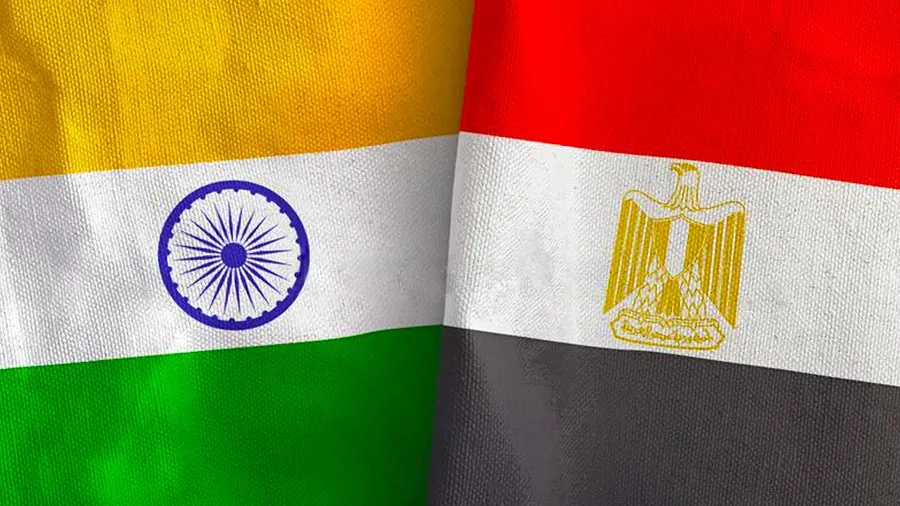
India - Egypt
India and Egypt signed a “landmark” strategic partnership treaty on Sunday, the last day of Prime Minister (PM) Narendra Modi’s two-day visit to Cairo. The two countries had previously reached an understanding when Egyptian President Abdel Fattah el-Sisi visited New Delhi in January of this year as the chief guest for the Republic Day parade.
Cairo is eager for further investments from India. It has urged that New Delhi use Egypt’s strategic location as a gateway to three continents: Europe, West Asia, and all of Africa, and it has raised the prospect of India establishing an industrial zone in Egypt.
Egyptian support would bolster India’s claim to the leadership of the Global South and closer relations with an Arab country beyond those in the Persian Gulf.
However, the pomp of Modi’s visit to Egypt had a message for his critics back home.The Egyptian President conferred the Order of the Nile Award, Egypt’s highest state honour. Bharatiya Janata Party social media chief Amit Malviya tweeted that Modi “has 13 such international awards from different countries, more than any other Indian PM has ever had”.
Finance Minister Nirmala Sitharaman said that “of the 13 awards he has been given as PM of the country, six have been given by countries where Muslims are in the majority”.
Modi also met the Grand Mufti of Egypt, a meeting that comes within days of former US President Barack Obama’s interview to CNN, where he said he would look to raise the subject of Indian Muslims with the Indian PM.
At a press conference in the national Capital, Sitharaman slammed Obama. “A former President under whose rule six Muslim-majority countries were bombed with more than 26,000 bombs. How will people trust his allegations?” she asked.
On Sunday, Modi and the Egyptian President held a “private one-on-one conversation”, a follow-up of the latter’s January visit to New Delhi. Over two days, the two sides discussed increased economic cooperation, including Indian investments in infrastructure, especially in the Suez Canal Authority, and signed agreements in agriculture and health care.
On Saturday, the first day of his two-day visit to Egypt, the first bilateral visit by an Indian PM since 1997, Modi met the India Unit in the Egyptian Cabinet, set up earlier this year after El-Sisi’s Delhi visit.
The unit proposed new areas of cooperation, while Modi “welcomed this ‘whole of government approach’ to take forward bilateral relations”, the Ministry of External Affairs (MEA) said.
Seven Egyptian Cabinet members, including the prime minister, were present at the meeting, along with Waleid Gamal Eldien, chairman of the Suez Canal Economic Zone (SCZONE), who had recently visited India. They talked about measures to boost trade and investment, as well as cooperation in the fields of green hydrogen, renewable energy, information technology, and pharmaceuticals.
The Indian side pledged to continue supporting Egypt’s application to join BRICS, an acronym representing the countries’ respective regional economies of Brazil, Russia, India, China, and South Africa. In spite of several demands, India was “looking actively” into BRICS membership for its “friendly and strategic partner” Egypt, according to Foreign Secretary Vinay Kwatra.
The PM’s other engagements included meeting the Grand Mufti of Egypt Shawki Ibrahim Allam on Saturday. “The Grand Mufti also appreciated the PM’s leadership in fostering inclusivity and pluralism,” the MEA said. Their discussions focused on issues related to social and religious harmony in society and countering extremism and radicalisation, the MEA said.
Kwatra said the Grand Mufti recently visited India, where he “had first-hand experience of India’s diverse and strong social and cultural fabric”. Modi said India would set up a Centre of Excellence in Information Technology at the Dar-al-Ifta, which the Grand Mufti heads.
On Sunday, the PM visited Al-Hakim mosque in Cairo, where he also met the leaders of the Bohra community, who are actively involved in the upkeep of the Fatimid-era Shi’a mosque. Modi has had close links with the Bohra community since his days as chief minister of Gujarat.
The PM met Tarek Heggy, a renowned Egyptian author and petroleum strategist, and their discussion covered issues related to global geopolitics, energy security, radicalism and gender equality, the MEA said.
He also got to know Hassan Allam, the CEO of one of the biggest Egyptian businesses in North Africa and West Asia, Hassan Allam Holding Company.
In recent months, Indian External Affairs Minister S. Jaishankar and Defence Minister Rajnath Singh visited Egypt in addition to visits from Egypt, which included that of the Grand Mufti and the chairman of the SCZONE. Additionally, Egypt has been asked to attend the Group of Twenty conference in India as a special guest.
In 2022–2023, India and Egypt had bilateral trade of $6.06 billion, which was lower than the previous year’s record high of $7.26 billion. With $4.1 billion in exports and $1.95 billion in imports in 2022–2023, India has maintained a trade surplus with Egypt.
Although there are many different products exported from India to Egypt, diesel is the most expensive ($311 million), followed by heavy equipment ($256 million), iron and steel ($223 million), and cotton ($201 million). The single biggest import from the nation is refined petroleum.
Around 50 Indian firms have made upwards of $3.2 billion in investments in the apparel, agricultural, chemicals, energy, autos, and retail sectors, according to the Indian Embassy in Cairo. They employ about 35,000 Egyptians directly and indirectly.
TCI Sanmar Chemicals, Alexandria Carbon Black, Kirloskar, Dabur India, Flex P Films, scib Paints, Godrej, Mahindra, and Monginis are just a few of the significant Indian interests in Egypt.
(This story has not been edited by Bharat Express staff and is auto-generated from a syndicated feed.)

















